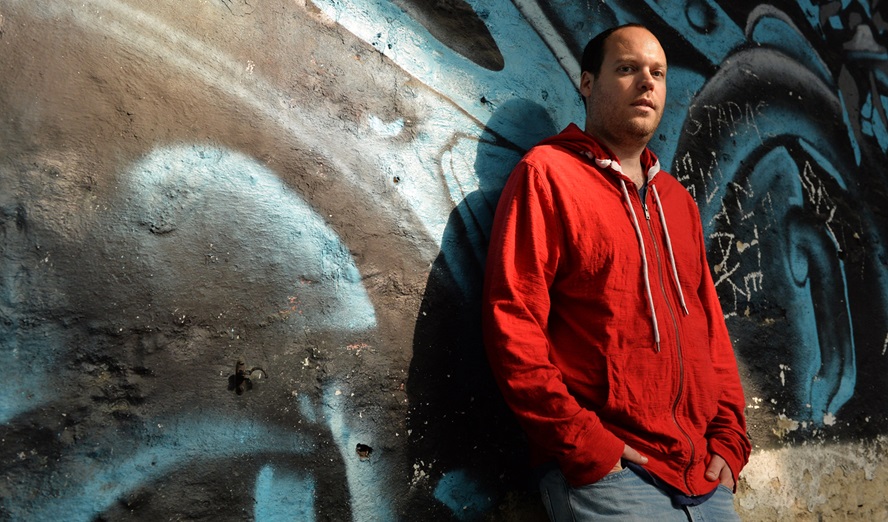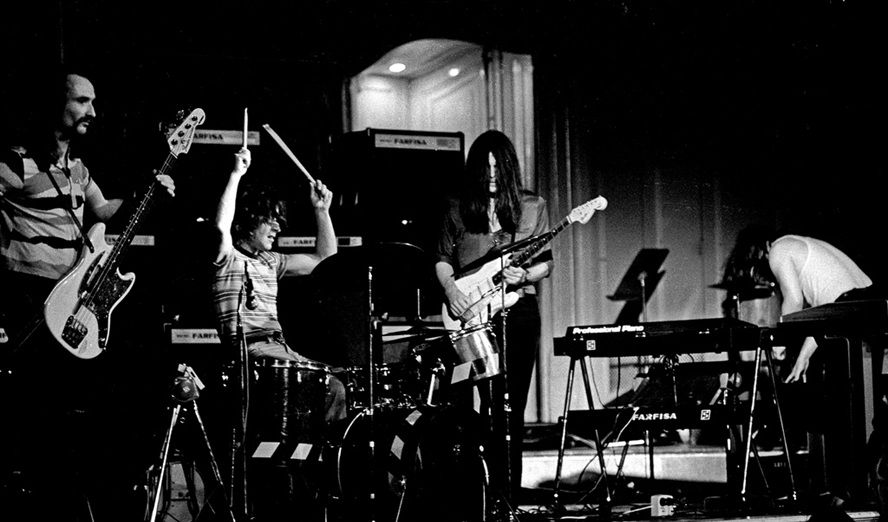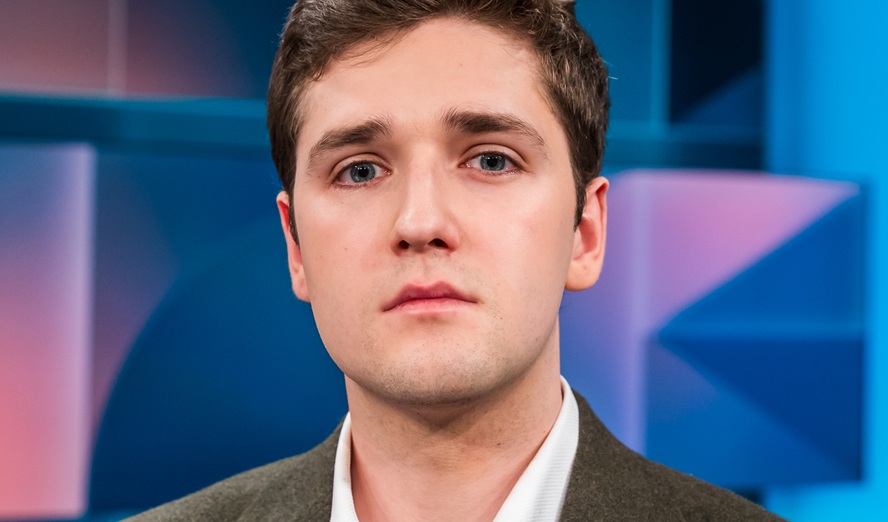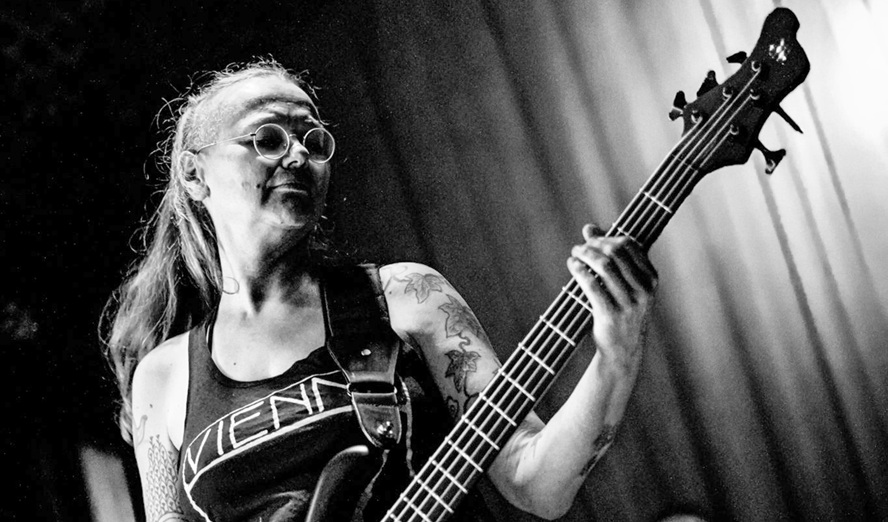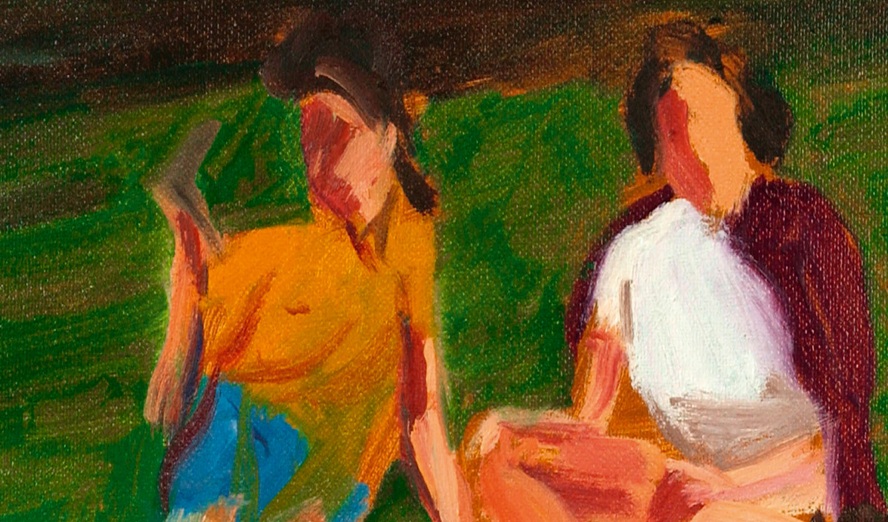Am Seder zu Pessach landet »Maror« auf dem Teller. Das ist bitteres Kraut, welches an die Zeit der Versklavung der Juden in Ägypten erinnern soll. Leicht zu erraten, warum Lavie Tidhar diese Symbolik für sein neues Buch wählte. Israel und seine umgebenden Länder sind bloß das aktuelle Kapitel in der Jahrtausende währenden, bitteren Geschichte der Jüdinnen und Juden. In seiner Reihe »Central Station« (2016) hat sich die menschliche Diaspora bereits bis zum Mars erstreckt. »Unholy Land« (2018) verortet den jüdischen Staat in Ostafrika und benutzt die Möglichkeiten der Science-Fiction und Speculative Fiction, um Parallelen zur Realität zu evozieren und Denkmuster zur beleuchten, im besten Fall aufzubrechen, um eine Ahnung der Komplexität der Realität und ihrer möglichen Alternativen zu geben, die an die Wirklichkeit aber kaum heranreicht. Ausgangspunkt waren zwar ernstzunehmende Ideen von zionistischen Pionieren, den Staat Israel nicht im historischen Palästina, sondern fernab geschichtlicher Wurzeln gänzlich neu zu beginnen. Was er macht, beginnt als recht klassische Detektivgeschichte, artet dann aber aus in ein Spiel mit Identitäten, dem Switchen zwischen verschiedenen Dimensionen, der Mystik und dem Alterieren dessen, was wir zuvor als eigentlich und zweifelsfrei erachteten.
Genregrenzen sind dafür da, dass man sie als Gerüst benutzt, in welchem dann passiert, was eben aus den gegebenen Materialien ganz organisch so passieren muss, meint Tidhar. So auch in »Maror«, bei dem die Konflikte der Grenzziehung und der Gründung des Staates behandelt werden. Hier jedoch wagt er den Versuch, weitgehend auf fiktionale und genretypische Elemente zu verzichten und den Blick auf das »real existierende Israel« zu richten, also aus einer bestimmten Perspektive, auf wahren Begebenheiten basierend, bis auf ein paar Dinge, die eben ausgedacht sind. Ausgangspunkte seiner Erzählung sind hier: ein Anschlag im Jahr 2000, eine Massenpanik auf einem Rock-Festival und eine Reihe ungeklärter Morde. Alles wirklich so passiert. Unweigerlich denkt man an die Einblendung der Cohen-Brüder im Vorspann von »Fargo«, in der es heißt: »This is a true story. […] At the request of the survivors, the names have been changed. Out of respect for the dead, the rest has been told exactly as it occurred.« Auch bei »Fargo« geht es weniger um die wirkliche Wahrheit, als um die Personen, die in ihr ihre eigenen Geschichten erzählen. Nicht alles ist wahr, aber es sagt mehr über die Realität, als man meinen könnte.
Die Geschichte in der Geschichte
Chaim Nachman Bialik, sowas wie Israels Nationaldichter, äußerte in den 1920er-Jahren den Gedanken, dass der Traum einer jüdischen Nation dann erfüllt sei, wenn es in dieser Nation auch jüdische Prostituierte, Diebe und Polizisten gebe. Später griff David Ben-Gurion, der erste Premierminister Israels, diesen Gedanken auf und formulierte ihn weiter. Er sagte sinngemäß, dass Israel ein normales Land geworden sei, wenn jüdische Diebe und Prostituierte ihre Geschäfte auf Hebräisch führten. Diese Bonmots als Leitworte nutzend, zeichnet Tidhar die Geschichte des Landes aus der Perspektive der Polizei bzw. Politik und der organisierten Kriminalität anhand zweier Antihelden, Cohen und Avi. Den älteren, Cohen, zeichnet sein Patriotismus aus, der ihn seine extrem brutalen Methoden rechtfertigen lässt. Avi hingegen wirkt fast zynisch, gleichgültig und bar jeden Ideals, kann selbst kaum ohne Drogen und porträtiert eine spätere Generation, die ohne Erinnerung an eine bessere Zeit und ohne Hoffnung auf eine bessere Zukunft existiert. Cohens immerzu zitierte Bibelstellen haben in ihrer Archaik etwas Komisches und begleiten die Leser*innen wie ein roter Faden durch die Jahre, wohingegen die Erwähnungen der Musiker*innen immer auf die jeweilige Zeit, in der sie erschienen, verweisen und über sie Auskunft geben.
Ausgangssituation der Geschichte ist der Mord an einer jungen Frau, doch der wird alsbald zur Nebensache. Man erlebt über 34 Jahre, von 2008 bis 1974, nahöstlicher Geschichte von Krieg, Drogen, Korruption, Machtmissbrauch, Hass und Mord sowie internationalen Verstrickungen mit den USA und dem kolumbianischen Dschungel oder der Unterdrückung von Journalist*innen. Fast wie Reportagen wirken die Episoden, die eine Gesellschaft porträtieren, die in der Normalität und Widersprüchlichkeit kapitalistischer Gesellschaften angekommen ist und deren Vorkämpfer*innen es nicht immer gelingt, Menschlichkeit zu bewahren, während sie bei permanenter Bedrohung Stärke zeigen müssen. Auf 639 Seiten führt Tidhar in epischer Weise kaum mehr zu entwirrende Verstrickungen politisch verfeindeter Parteien aus, wobei Begriffe wie »gut« und »böse« nahezu gänzlich ihre Bedeutung verlieren. Die Trostlosigkeit der Geschichte wächst mit der über Jahrzehnte immer schwerer zu durchschauenden Gesamtsituation. Wegen der gekonnt konstruierten Kriminalgeschichte einerseits, andererseits aufgrund des lebendig beschriebenen Lokalkolorits, also Tidhars Kenntnis von Kultur und Politik, entwickelt der Roman eine absorbierenden Stimmung, die die Leser*innen immer tiefer in den Sumpf der Realität zieht. Im Zoom-Interview erzählt er mehr dazu …
skug: Connection established!
Lavie Tidhar: It’s the first time I get to do one of these »Zoom, not in my room, kind of crouching somewhere« interviews. One day, I’ll have a background with books behind me, but like a proper author.
How has the reaction to your new novel been so far? It looks like you have already become a proper author…
It has been amazing. I’m not used to this level of interest in a book. It’s really hard to get anyone interested in books, period. I’m grateful for the fact that it’s getting covered. Someone sent me a picture of it from Murnau in Bavaria, in a little bookshop. I thought if it’s in more shops now, you’ve made it. It’s been surprising, to be honest. I guess the timing kind of helped. I don’t know. Or maybe they just thought it was a really superb book regardless.
You got a long feature on Deutschlandfunk.
I’m not used to that. I mean, when it came out in the UK, I did get to do the radio, like BBC Four or something, which was a new thing to me. When you write science fiction, you don’t usually get radio features, just a newspaper if you’re lucky. So it’s a nice change.
When did you start writing the book? What was the trigger that made you change from science or speculative fiction to fantasy to almost retelling of reality as a thriller?
I wanted to write this book for a very long time. And partly the issue was that my writing, even my science fiction, is all about political realities. I’ve written books about the Holocaust, about Israel and Palestine, about British nationalism and fascism – but always in the context of genre fiction. I think people who want to read about political themes don’t necessarily want you to put weird stuff in it. And the people who like the weird stuff don’t really want you to put politics in it. So I was sort of falling in between, and the idea was that maybe I should just take out the weird stuff and write it as a straight book. And my British publishers were actually supportive enough to say: »Go and write whatever book you want to write instead of trying to chase a trend or whatever. Just do what you want, and we’ll publish it.« So I knew that I could actually sit down and write this book. I was planning it for a very long time before I actually started writing it.
»Maror«, like »Unholy Land« as well, deals with the Jewish homeland in a special way. As someone who is living in London, what does it mean to cover these subjects from abroad?
I think it helps. I keep saying it’s a bit like when James Joyce was writing »Ulysses«, he wasn’t writing it in Ireland. And he said I need to be outside of Ireland to be able to write about Ireland. It does help because you’re more detached. You can look at things more critically, and I don’t think you can have these conversations in Israel very easily. And my books are not published in Israel either. I don’t think they would understand the stuff, but I was able to draw on a lot of historical research. I had access to archives of a century of Hebrew newspapers. Originally, I thought I’d have to go back there and spend a couple of years researching. In the end, I was able to use both research tools and draw on my own experiences and my childhood, and when I needed to, I just interviewed people.
You came from a kibbutz in Israel; you lived in Laos and on Vanuatu, a South Pacific island. And now you’re in London. What does it say about you and your writing?
I actually speak the language, Bislama, the South Pacific Pidgin. I ended up writing a column for like a year after I left. There was this urge to write in Bislama and my friend was editing the newspaper there and gave me a column in the newspaper. So once a week for one year, I wrote a short story in Bislama, which is a language that no one actually writes fiction in. So it was a really nice experiment.
What kind of column was it?
It was sort of Vanuatu-specific fiction, very short, and usually fits on one page in the newspaper. I tried to translate some of them into English, but they don’t work as well. I think it’s because I’m a very lazy and boring person, so I had the idea that if I don’t go and travel and live in interesting places, I won’t have anything to write about. And then, when I did get to do those things, I realized: »I’m still a very boring person. I just get to live in interesting places.« It didn’t really work out that well. It’s easier to write about things that you know. I can’t write about America. I can’t write a convincing book set in America because I don’t really know America other than through TV and film. I need to be able to know what the places smell and what they sound like.
You wrote about the Middle East and the history of Israel. I can hardly think of a more complex, contradictory and ambiguous history. What do you think fiction can do to cover these ambiguities and help understand them?
I think that’s what fiction does: it looks at the ambiguities; it says things are complicated. It tries to unpack and unravel some of that stuff, but it’s also not there to provide easy answers. And I think that’s the problem. When you do an interview, everyone wants you to give a nice quote that they can use, having just spent more than 600 pages trying to talk about the topic? You can’t reduce it to an easy soundbite, but I think we have this problem that things that are complicated tend to be reduced ever more into tweets.
»Maror« has more than 600 pages and still only covers a small part of that specific history…
I’m still writing! I had the idea that »Maror« was the first in a sort of trilogy of books exploring that, and so they go further and further back in time. I’m still working out what I think about it and learning new stuff as I’m writing, because I’m writing the third one at the moment. It goes back to the Ottoman Empire and then to the British Mandate. So I’m still finding out a lot of things I didn’t know, and it still makes me question my own assumptions. So my job is to show it on the pages and let people think about it themselves.
What made you choose the genre of a detective thriller?
Well, I like detectives because they allow you to ask questions. That’s the main point. I’ll tell you what happened to me with »Unholy Land«. I wrote the outline for »Unholy Land« for my publisher at the time, and I said it’s about this author, and he comes to this place, and he’s looking for his missing niece, and then things start to happen. She came back to me and said: »This is great. But what happened to the niece?« And I said: »What do you mean?« She goes: »Well, he was looking for his missing niece. What happened to her?« And I completely forgot that he was looking for his missing niece, because that wasn’t the point of the book. It wasn’t a detective story. It was a story about this world. But obviously, once she pointed it out, I realized I do have to pay off the reader. And we do have to find the niece at the end of the book.
That reminds me a lot of Bolaño and Pynchon. The detective becomes only a vehicle to tell a story, not to solve crimes anymore.
I love postmodern detective fiction. And »Holy Land« is very much a postmodern detective story. With »Maror« I didn’t want to do that. I wanted to write a book that would be accessible to people without the weird stuff. My rule was literally to write it very simply, to not have any of those postmodernist games or literary quotations. There are no references to other works other than the music. My only other rule for it was not to make it funny. I want to be a serious author, and I want to be taken seriously, so there shouldn’t be any funny stuff in the book. And then I was talking to a TV producer who wants to make it into a TV show, and the first thing she said to me: »I loved your book. It was so funny.«
Oh, really?
I was like: »No, I didn’t want it to be funny.« But I can’t escape putting humor into it because it’s ridiculous. Otherwise, it just becomes relentlessly grim. I did a book on Hitler called »A Man Lies Dreaming«, and it’s a very, very funny book about the Holocaust, which is a terrible thing to say. But I think without humor, there’s no point to it. The grimness doesn’t work unless there’s some humor underneath or above it. With the new one that I’ve done just now, »Six Lives«, which is not connected to this sequence and has nothing to do with Israel, I allowed myself to be a bit more playful and do a bit more of the postmodernist stuff, a little bit more commentary on genre. But »Maror« is based on real stuff, it is heavily researched, and I didn’t make anything up. I never really make anything up in books anyway, because reality is always weirder, you know?
Are there any authors who have influenced you in writing »Maror«?
That’s a tough one. In a way, I guess, the obvious comparison is someone like James Ellroy. The way he did those epic crime stories. Just apply it to a different era. Or Don Winslow.
How was writing it? What was your approach?
I don’t even remember writing it. But it was almost journalistic somehow. The writing was very clean and simple. And to be honest, the book that follows it, which is set over a longer span of time, and it’s more of a family saga, that’s when I was struggling because I’ve never done a family saga before. »Maror« was sort of a pleasure to write because, even though I didn’t know what I was going to be doing, I kind of trusted that it would lead me there. And once you discover all these things, it was so delightful to write about it.
How did you do the research? Did you talk to people a lot? Did you draw a lot from your own experiences?
It draws on my own experiences, for example, the scene at the music festival. I was at the music festival in 1994. My brother was actually there at that disaster concert that I portrayed in the book. But he wasn’t very useful as a witness, I have to say. He said: »Well, yeah, we were there, and we were kind of aware that something was going on. And then we went home«.
And he was drunk, probably.
No, he was 16 or 17. Kids in Israel back then were good kids.
Okay!
People are not very reliable. So I was using the newspaper archives. I had a crime reporter, a retired crime reporter, who was chatting to me every now and then and pointing me in various directions. My dad was surprisingly helpful about some of these stories, he appears to know many dodgy people. I don’t know why, but my dad knew the guys who trained the Colombian cartels for example. He grew up with one of them. So he gave me some important details. And he actually knew the guy who was put in prison for the murders in the 1970s.
The guy in the book is real as well!
Yes! He knew that guy, and he was like: »Yeah, he was a lovely guy. Very lovely.« That was very helpful.
The detective was you.
I was acting like a detective throughout the book. I only knew three points in the book that I wanted to write about, and even those I didn’t really know anything about. So I was researching and connecting the dots by myself, and I hoped the reader gets the same experience of working it out as you go along. Initially, I thought it was going to be a serial killer story, but I didn’t want to write a serial killer story because they’re not interesting to write about; there’s nothing fascinating about them. But what I discovered is that the investigation into it was so absorbing – the stuff about the radical left-wing activists, the dodgy boyfriend. And when they basically beat up this guy, he wanders in with PTSD to the police station, and they’re like, well, we’re going to beat him up until he confesses. Which is all so much more worth telling, regardless of who actually committed the crimes. My own perception of it was changing as I found out about it.
I read it as a panorama of Israeli society as well. And a big aspect of it was music. The book started with music. The first chapter is called »Infected Mushroom«. Why start a book with a psytrance band?
The music reflects the era, and it reflects the characters. I knew most people wouldn’t have a clue what this music actually was, but a lot of it is just the sound of the names. So when I mentioned in the 1990s that there’s a band called The Tractors Revenge, no one would listen to The Tractors Revenge, but it tells you something about that society in the 1990s. I can guarantee you that a Seattle band would not be called The Tractors Revenge because tractors are not part of the Seattle picture. The kids who were making music in the 1990s were all from the kibbutzim or from that sort of stuff. And if you want to look at the way they treated women, all you have to do is listen to the music: »I watch her on the way from school«, really creepy music about boys pinching girls. So »Infected Mushroom« was, regardless of their music, a good choice to show how we mean to start. It has a bit of a soundtrack that no one has probably ever listened to or would necessarily know. The idea is that it reflects the characters and the era. Regardless of whether you’ve ever listened to the music or not.
You wrote a lot about Aviv Geffen. Why is that?
He was very big at the time, and he’s an important figure just for the period. Plus, I thought it was funny. That’s what the kids were listening to, and my cousin was obsessed with him, and she’d follow him around and all the rest of it. It was fun going back to all this music that I grew up on in the 1990s. It represents such a lively period in time because it was only really 1990–1993. There was this flowering of this music and the students. Rabin was murdered in 1995. That kind of music stops. No one wants to listen to it anymore. The radio stops playing that music. It goes back to playing the good old Israel songs, as they’re called, and that’s it. The death of the music was so intrinsically linked to the death of this hope of peace and the rest of it. My next book, »Adama«, goes back in time and back to the songs from the 1940s. I needed to represent that feeling of the 1940s in the stuff that we’re singing and realized that all the songs were pretty much the same. There was something about »the wind and the cypress trees and the campfire, and you look beautiful in the light of the fire, but I have to go to war. So let’s go and have a quickie behind the barn, and then I’ll leave you to go and die in war.« It’s that sort of thing. So I wrote my own version of it from just putting all of that stuff together. And I only used that one song throughout the book that I wrote myself. And then, of course, the publisher said: »But have you got permission to quote from this song?« So I said: »I’m way ahead of you. I wrote it.«
So you do make things up! Like the science fiction author reading in the Otherland bookshop in Berlin (which is, by the way, really the best bookstore in the world) that you write about in »Unholy Land«!
This is the thing: At first, I thought it was funny, which again is always a motivation for me. And the name was perfect: Otherland Bookshop. And Hitler shows up in the audience. I don’t know if you noticed. There’s a sort of homeless Hitler time-slip in another reality, and he sits in the audience. Firstly, I thought it was very funny. But secondly, if I write it, maybe they’ll invite me to the show. I wrote about them, but they never invited me.
When I read it, I thought it had really happened. I was sitting there myself as a spectator and it was perfectly portrayed. It’s just that the readings are now often sold out.
I’ve done enough events where no one ever showed up. I know the drill for how these things work. The other reason I chose Berlin is that there are so many Israelis in Berlin. And it made sense for my guy to be living in Berlin and to be this unsuccessful wannabe because there’s so many of them. And occasionally I get emails from some of them, trying to rope me into some weird avant-garde project that they’re doing. And so I thought it was funny again to make fun of that. And it made sense for me for him to be in Berlin and not in London or somewhere.
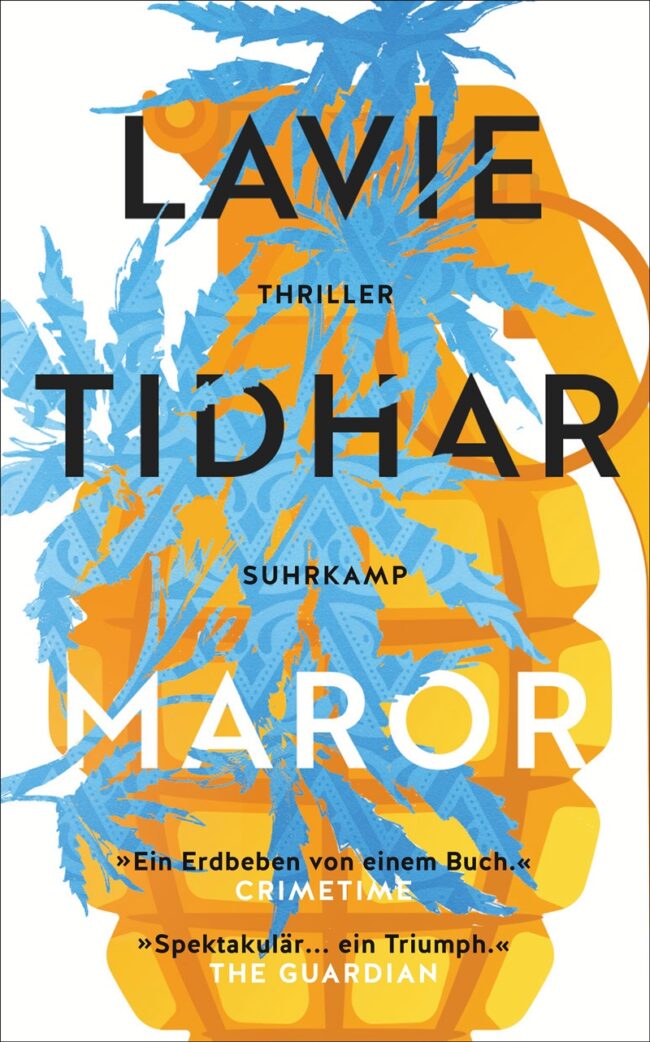
Nachspann: Eine kuratierte Playlist von Lavie Tidhar
There is a special resonance to the music you listened to when you were young. And the 1990s had a special kind of music, both in Israel and abroad. It was a time of intense and lasting change – or, naïvely, at least seemed to be. The Berlin Wall fell in 1989, and the Soviet Union followed suit in 1991. The old world order was collapsing around us. In Israel, the last war – a disastrous invasion of Lebanon – really did seem like it might be, as in the old Hebrew song, the last. Peace was coming. By 1993, mortal enemies Yitzhak Rabin and Yasser Arafat shook hands on the White House lawn.
The music that briefly, gloriously flourished during that first, fragile half-decade was something Israel had never experienced before, and it would end with two shots at close range on November 4th, 1995. I wasn’t there by then. I was already in the process of leaving it all behind.
The rock bands that arose in Israel at that time sang songs of a freedom that none of us knew. Of normalcy, with lyrics about love and heartbreak and simple nonsense words. »The next one in the line is a horse,« sang the Top Hat Carriers.
Before that, all our songs were about war. The wind blew in the tops of the cypress trees, and you were pretty by the fire. I took your hand and led you to the barn house. Wait for me, love, as tomorrow I go to battle.
Every song was about tanks, about dying, and about war. The man climbs down from the tank to carry his lover in his arms. By the side of the road to Jerusalem lie our dead. And that damn wind in the cypress trees. If the songs weren’t about war, they were nostalgic for a past that never happened. For little Israel, the one that was there before we came along. And then there were the songs for peace. So many songs for peace! No country ever wrote so many songs for peace and went to war so much.
But all that was in the past. Aviv Geffen showed up in makeup and, with a reedy voice, sang that we were the children of the moonlight. I wore a nose ring (it got infected) and hitchhiked to the nearest town on a whim one day to get tattooed. In Tel Aviv, in smoky bars, bands played electric guitars. I went to a festival in the desert and fell impossibly in love with the lead singer of an all-girl band, Inbal Perlmuter, who, like the music, died a few years later…
Here are three songs from the era, complete with those charmingly naïve music videos that felt so revolutionary back then:
The Witches: »Until The Next Pleasure«
How much do I love The Witches? I got to see them live in 1994 in one glorious concert, long before I grew my hair and long before I lost my hair – age catches to us all! Age never did catch up with Inbal Perlmuter, who died at just 26 in a car crash. But she’s alive every time you listen.
Mashina: »Goodbye Youth, Hello Love«
The classic goodbye song to the 90s, and a little bit noir with that music video and blurry images of a vanished Tel Aviv. I referenced it in »Maror«.
Where’s The Kid: »What I’m Going Through«
Probably the best rock band of the time, and this is one of those classic »I met a girl but I lost her« songs – aren’t all classic rock songs just that? And that video is another pure 90s effort.
Link: https://www.suhrkamp.de/buch/lavie-tidhar-maror-t-9783518473979
